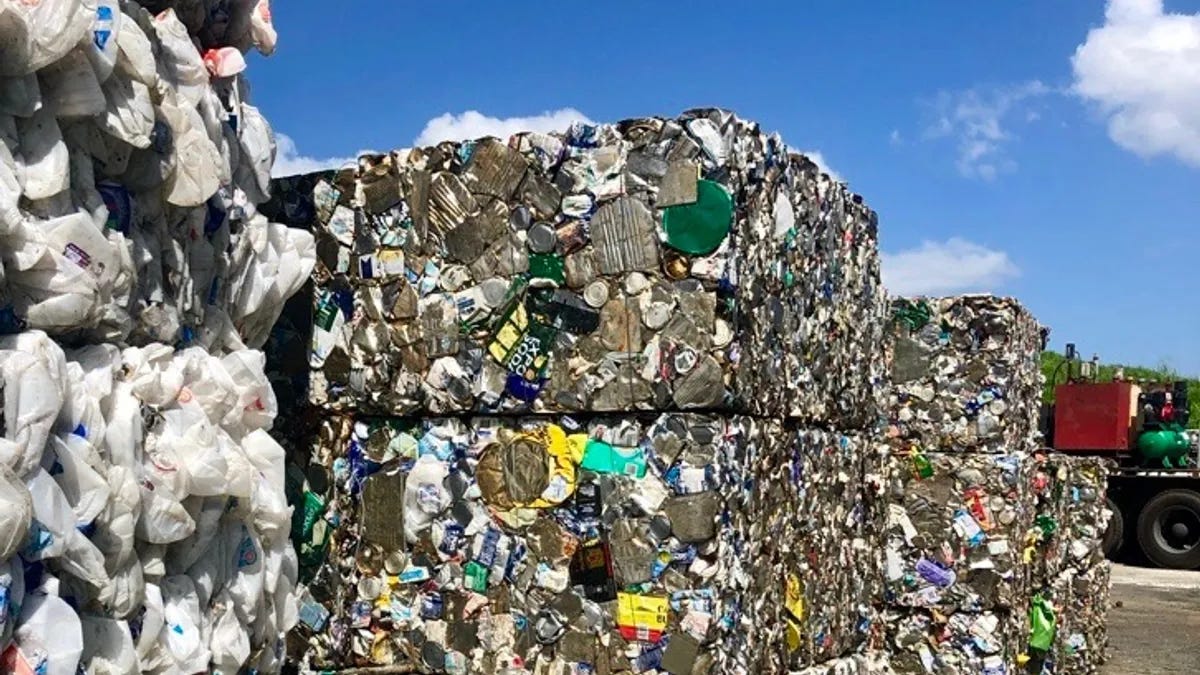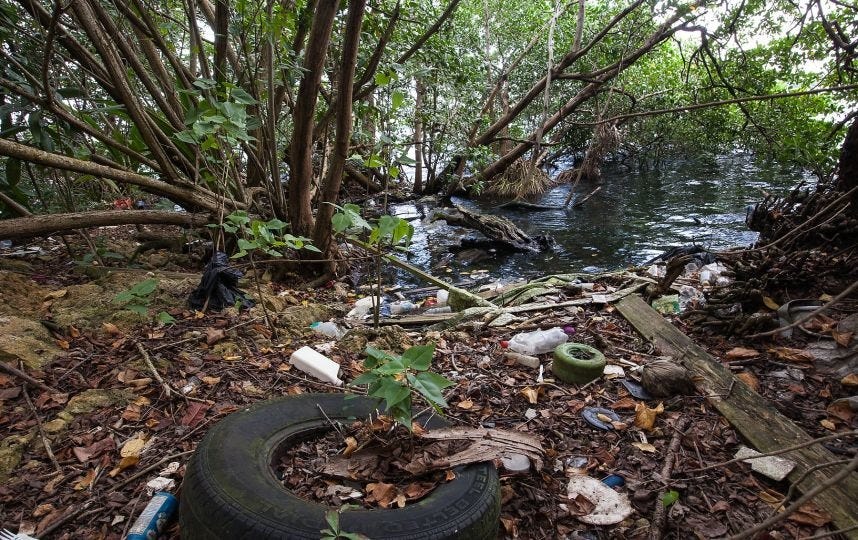Paradise tossed
Puerto Rico’s trash crisis reveals how the breakdown of basic systems leads to wider collapse.
There actually is a floating island of garbage in the middle of the ocean right now, and it really is called Puerto Rico. Tony Hinchcliffe’s joke during a Trump rally may have faltered and nearly cost a man the election of a lifetime, but there was truth to it.
While for many of us, waste management is a mundane part of life that happens in the background, in Puerto Rico it has become an insurmountable problem. Bureaucratic missteps, logistical nightmares, and neglected infrastructure have compounded to such a degree that the island is on the brink of crisis.
Puerto Ricans generate approximately 3.7 million tons of waste annually, or about 1,420 pounds per person each year. There are around 29 landfills in operation on the island, but many of them are full or nearing their capacity. Some don’t meet federal environmental standards and face imminent shutdown.
Bureaucracy has stymied the building of new landfills. Meanwhile, recycling facilities are few and far between, activists are blocking efforts to open waste incinerators, and funding for waste management infrastructure is scarce. These compounding obstacles mean a basic task has seemingly become an unsolvable problem.
As a result, trash is accumulating in neighborhoods, public spaces, and once-pristine natural areas. On an island known for its stunning beaches and biodiverse forests, this waste crisis is particularly jarring, turning some of Puerto Rico’s most cherished landscapes into dumping grounds.
This breakdown exposes a deeper, systemic failure that reflects how even basic systems can crumble under the weight of complexity, pointing to a broader collapse.
In many ways, Puerto Rico’s experience serves as a warning for other places with resource constraints, environmental vulnerability, and mismanaged public services. The waste piling up on its shores could easily be their fate if these systemic issues remain unaddressed.
According to the Environmental Blog, Puerto Rico’s landfills have been full for years. Only 10% of waste is recycled, and Puerto Ricans, like people everywhere, have a high per capita consumption of goods, plastic, and single-use items. Millions of tourists also visit the island yearly, creating more litter.
As piles of uncollected garbage contaminate rivers and coasts, pollute ecosystems, and harm marine life, that very tourist industry on which the island relies may be put at risk. Once sought-after beaches are now littered with garbage, deterring visitors and impacting a crucial source of income.
On a social level, the crisis has created hazardous conditions in many communities. Residents living near overburdened landfills are exposed to pollutants, and open garbage attracts pests, posing health risks.
As the waste issue spirals out of control, Puerto Rico’s trash crisis reveals how the collapse of a single system — waste management — can seep into nearly every aspect of life, from public health to economic stability. This cycle of decline is both a symptom and a catalyst for a larger breakdown in infrastructure and quality of life.
Puerto Rico’s waste problem is also emblematic of a deeper, structural vulnerability: dependence on external aid. The island’s reliance on imported goods, along with limited local recycling facilities, means that trash accumulates faster than it can be processed. When federal aid or external resources fail to meet local needs, Puerto Rico is left with few options for handling the crisis. This dependency has eroded the island’s ability to manage basic services independently, exposing the risks that come with relying on complex, external systems for essential needs.
Puerto Rico’s waste crisis is particularly unsettling because it defies the expectation that developed regions — especially those connected to wealthy nations — should be able to manage basic services. But this issue reveals the stark contrast between the illusion of modern progress and the reality of systemic fragility. Despite being part of a developed country, Puerto Rico’s trash problem underscores how insufficient funding, poor planning, and governmental neglect can cause even simple systems to falter. When infrastructure is pushed to its limits without meaningful intervention, small problems snowball into crises that erode public trust and destabilize communities.
Puerto Rico’s experience reminds us that the collapse of basic systems is not a distant possibility but an immediate reality. For communities around the world, Puerto Rico’s trash crisis is a wake-up call, urging us to recognize and address the vulnerabilities in our systems before they, too, are overwhelmed.





It's not just Puerto Rico. They are just the canary in the coal mine warning of what is going on everywhere.
It really comes down to the fact that the environmental movement has been destroyed by both the faction that has used it to promote their Marxist dreams along with the corporate leaches that have made it a scam by just promoting lip service over actually addressing the problems.
99.5% of all recycling is a scam. Yes, that is a totally made up statistic but I believe it is most likely accurate -- if not conservative. Just about every product that you buy is ridiculously over packaged. Everything is designed for single use.
One of the biggest sources of the waste is companies making things intentionally non-interchangeable to create vendor lock-in. They also want to make everything non-serviceable so things have to be replaced rather than repaired.
Puerto Rico is just a preview of what awaits the rest of the world. When you base an economy on the concept of perpetual growth, the inevitable result is the exhaustion of resources. Manufacturers now use extremely low quality in order to keep production going, creating our landfill economy. The end result is illustrated in James Howard Kunstler's "World Made by Hand" series that explores what happens when the oil is all used up. Those who own landfills become the providers by mining the buried trash for usable items, like bent nails and empty glass containers. As pointed out here by David Kirtley, recycling is a cruel joke. Our relentless pursuit of comfort through technology will get us to a point where the resources needed to keep it going will be exhausted. Already makers of electric cars are having to consider reducing the range of cars because the materials needed to make batteries are becoming scarce. In this podcast (https://jameshowardkunstler.substack.com/p/kunstlercast-411) Christopher Bystroff theorizes that we are at or past the population that the earth can carry. When this happens in nature, the organism that has excessive numbers dies off until equilibrium is again reached.